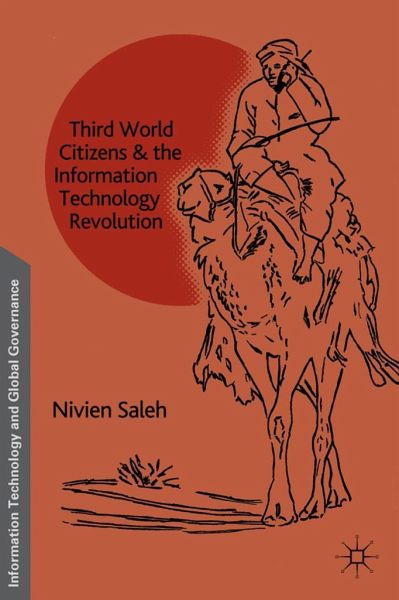
N. Saleh
Gebundenes Buch
Third World Citizens and the Information Technology Revolution
Versandkostenfrei!
Versandfertig in 6-10 Tagen
Weitere Ausgaben:

PAYBACK Punkte
19 °P sammeln!





This book challenges the widely-held view that the information technology (IT) revolution has empowered people in the Third World. Tracing the making of the global IT regime, it shows that governments and corporations of the wealthy countries dominated this process, systematically excluding representatives of low-income countries.
NIVIEN SALEH Assistant Professor of International Studies at the University of St. Thomas in Houston, Texas, USA.
Produktdetails
- Information Technology and Global Governance
- Verlag: Palgrave Macmillan / Palgrave Macmillan US / Springer Palgrave Macmillan
- Artikelnr. des Verlages: 978-0-230-10364-1
- 2010 edition
- Seitenzahl: 273
- Erscheinungstermin: 19. Januar 2011
- Englisch
- Abmessung: 211mm x 145mm x 18mm
- Gewicht: 489g
- ISBN-13: 9780230103641
- ISBN-10: 0230103642
- Artikelnr.: 30976856
Herstellerkennzeichnung
Libri GmbH
Europaallee 1
36244 Bad Hersfeld
gpsr@libri.de
'In this engaging book Nivien Saleh successfully lays to rest the wrong-headed notion that the IT revolution is a great equalizer between rich and poor. Instead the rules of the international game and the way they are enforced put poor countries like Egypt at a great disadvantage. For the majority of the people in a globalizing world the IT revolution is a non-revolution.' - Peter J. Katzenstein, Walter S. Carpenter, Jr. Professor of International Studies, Cornell University, USA
"I am blown away. The book is engaging and well written, theoretically grounded, and rich in empirical detail. It will make an immediate contribution to our understanding of global governance processes for information and communication technologies." - Derrick L. Cogburn, Associate Professor of International Relations, International Communication Program, School of International Service, American University, and editor of the Palgrave series Information Technology and Global Governance
"Nivien Saleh has written a brilliant and long overdue account of how information technology and communication, far from liberating and democratizing the world, tend far more to serve the interests of corporations and those sitting atop the global
"Nivien Saleh has written a brilliant and long overdue account of how information technology and communication, far from liberating and democratizing the world, tend far more to serve the interests of corporations and those sitting atop the global
Mehr anzeigen
political economy. This is a very good book by a promising young writer." - Robert W. McChesney, co-author, The Death and Life of American Journalism
"In this engaging book Saleh successfully lays to rest the wrong-headed notion thatthe IT revolution is a great equalizer between rich and poor. Instead the rules of the international game and the way they are enforced put poor countries like Egypt at a great disadvantage. For the majority of the people in a globalizing world the IT revolution is a non-revolution." - Peter J. Katzenstein, Walter S. Carpenter, Jr. Professor of International Studies, Cornell University
"Saleh's study is a welcome addition to the stream of literature on private market-oriented globalization. It makes a compelling case for re-thinking economic development and citizens' empowerment and autonomy in cosmopolitan-democratic terms." - Heikki Patomäki, Professor of International Relations, University of Helsinki
"Saleh has written an important, well documented, and very readable book that contests the prevalent assumption that globalization is all to the good. Her focus sweeps from a Houston televangelist whose books sell in 25 languages to the people of Egypt and otherpoor countries, to whom the information technology revolution has not brought the 'empowerment' that many authors proclaim. One may question what motives lie behind globalization, but Saleh's description of the often negative consequences is grounded in hard fact." - Peter Bridges, former executive secretary of the U.S. Treasury Department and ambassador to Somalia
"In this engaging book Saleh successfully lays to rest the wrong-headed notion thatthe IT revolution is a great equalizer between rich and poor. Instead the rules of the international game and the way they are enforced put poor countries like Egypt at a great disadvantage. For the majority of the people in a globalizing world the IT revolution is a non-revolution." - Peter J. Katzenstein, Walter S. Carpenter, Jr. Professor of International Studies, Cornell University
"Saleh's study is a welcome addition to the stream of literature on private market-oriented globalization. It makes a compelling case for re-thinking economic development and citizens' empowerment and autonomy in cosmopolitan-democratic terms." - Heikki Patomäki, Professor of International Relations, University of Helsinki
"Saleh has written an important, well documented, and very readable book that contests the prevalent assumption that globalization is all to the good. Her focus sweeps from a Houston televangelist whose books sell in 25 languages to the people of Egypt and otherpoor countries, to whom the information technology revolution has not brought the 'empowerment' that many authors proclaim. One may question what motives lie behind globalization, but Saleh's description of the often negative consequences is grounded in hard fact." - Peter Bridges, former executive secretary of the U.S. Treasury Department and ambassador to Somalia
Schließen
Für dieses Produkt wurde noch keine Bewertung abgegeben. Wir würden uns sehr freuen, wenn du die erste Bewertung schreibst!
Eine Bewertung schreiben
Eine Bewertung schreiben
Andere Kunden interessierten sich für











